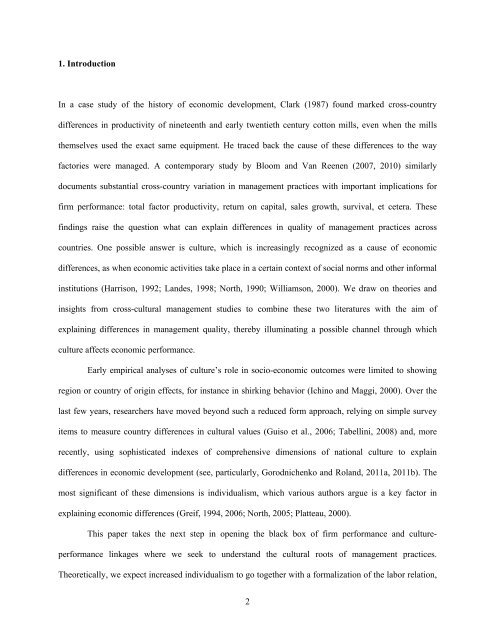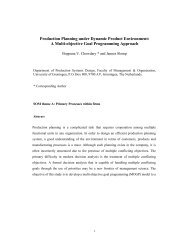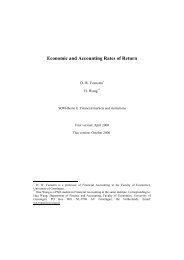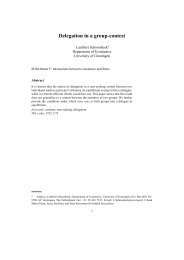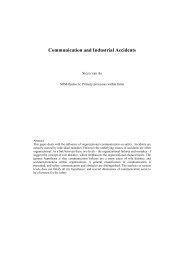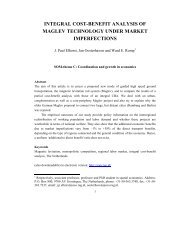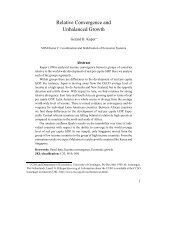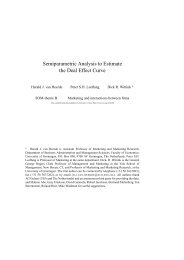Individualism and the cultural roots of management practices
Individualism and the cultural roots of management practices
Individualism and the cultural roots of management practices
Create successful ePaper yourself
Turn your PDF publications into a flip-book with our unique Google optimized e-Paper software.
1. Introduction<br />
In a case study <strong>of</strong> <strong>the</strong> history <strong>of</strong> economic development, Clark (1987) found marked cross-country<br />
differences in productivity <strong>of</strong> nineteenth <strong>and</strong> early twentieth century cotton mills, even when <strong>the</strong> mills<br />
<strong>the</strong>mselves used <strong>the</strong> exact same equipment. He traced back <strong>the</strong> cause <strong>of</strong> <strong>the</strong>se differences to <strong>the</strong> way<br />
factories were managed. A contemporary study by Bloom <strong>and</strong> Van Reenen (2007, 2010) similarly<br />
documents substantial cross-country variation in <strong>management</strong> <strong>practices</strong> with important implications for<br />
firm performance: total factor productivity, return on capital, sales growth, survival, et cetera. These<br />
findings raise <strong>the</strong> question what can explain differences in quality <strong>of</strong> <strong>management</strong> <strong>practices</strong> across<br />
countries. One possible answer is culture, which is increasingly recognized as a cause <strong>of</strong> economic<br />
differences, as when economic activities take place in a certain context <strong>of</strong> social norms <strong>and</strong> o<strong>the</strong>r informal<br />
institutions (Harrison, 1992; L<strong>and</strong>es, 1998; North, 1990; Williamson, 2000). We draw on <strong>the</strong>ories <strong>and</strong><br />
insights from cross-<strong>cultural</strong> <strong>management</strong> studies to combine <strong>the</strong>se two literatures with <strong>the</strong> aim <strong>of</strong><br />
explaining differences in <strong>management</strong> quality, <strong>the</strong>reby illuminating a possible channel through which<br />
culture affects economic performance.<br />
Early empirical analyses <strong>of</strong> culture’s role in socio-economic outcomes were limited to showing<br />
region or country <strong>of</strong> origin effects, for instance in shirking behavior (Ichino <strong>and</strong> Maggi, 2000). Over <strong>the</strong><br />
last few years, researchers have moved beyond such a reduced form approach, relying on simple survey<br />
items to measure country differences in <strong>cultural</strong> values (Guiso et al., 2006; Tabellini, 2008) <strong>and</strong>, more<br />
recently, using sophisticated indexes <strong>of</strong> comprehensive dimensions <strong>of</strong> national culture to explain<br />
differences in economic development (see, particularly, Gorodnichenko <strong>and</strong> Rol<strong>and</strong>, 2011a, 2011b). The<br />
most significant <strong>of</strong> <strong>the</strong>se dimensions is individualism, which various authors argue is a key factor in<br />
explaining economic differences (Greif, 1994, 2006; North, 2005; Platteau, 2000).<br />
This paper takes <strong>the</strong> next step in opening <strong>the</strong> black box <strong>of</strong> firm performance <strong>and</strong> culture-<br />
performance linkages where we seek to underst<strong>and</strong> <strong>the</strong> <strong>cultural</strong> <strong>roots</strong> <strong>of</strong> <strong>management</strong> <strong>practices</strong>.<br />
Theoretically, we expect increased individualism to go toge<strong>the</strong>r with a formalization <strong>of</strong> <strong>the</strong> labor relation,<br />
2


